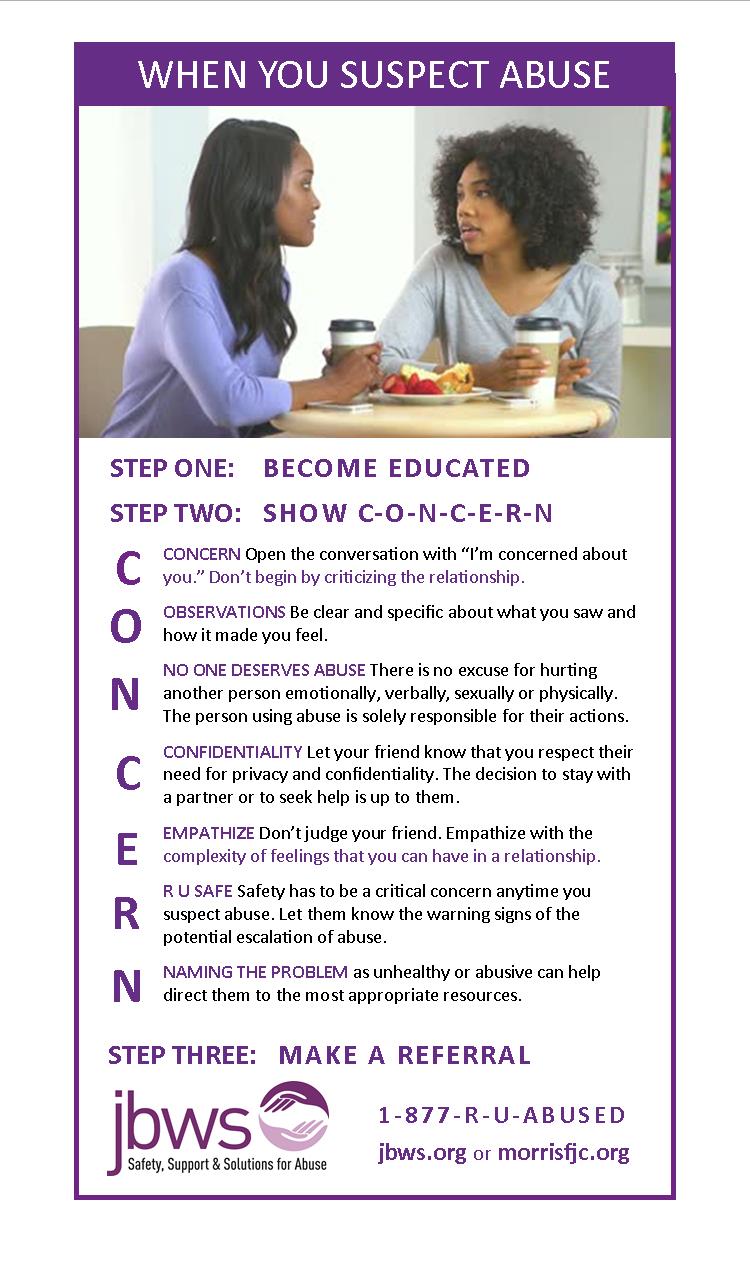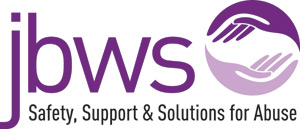Signs of Abuse
How to Help
JBWS Services
Signs of Abuse:
Domestic violence does not always present in the same way for every person. However, there are a few signs of how domestic violence may interfere with a person's job performance, productivity, and more below.
A person experiencing domestic violence may struggle to concentrate at work. Their productivity level and quality of work may suddenly decrease or they might show an inconsistent quality of work.
While partners may visit each other at work from to time, this becomes a sign of abuse if the visits become increasingly frequent, unplanned, and disruptive to a person's work day. It's important to note that this sign of abuse extends to both current and former partners and spouses.
To hide bruises or other injuries, a person experiencing abuse may wear clothing that does not match the season such as turtlenecks and long sleeves in the middle of summer or sunglasses while indoors. Additionally, a person experiencing abuse may also wear unusually heavy make up.
A person using abuse may attempt to control their partner by calling or texting them an unusual number of times throughout the day. The person experiencing abuse may feel obligated to answer these calls or texts out of fear of their partner's reaction.
In an attempt to sabotage their partner's career, a person using abuse may hide their partner's keys or disrupt their morning routine to make them late to work. They may demand their partner leave work early or refuse to let them go to work at all. Often times, this is done to keep the victim financially reliant upon the partner using abuse.
There may be restrictions placed upon a person experiencing abuse so they may not be allowed to make friends with their coworkers, may not be allowed to go to team building events, or be unusually quiet. They may struggle from signs of anxiety, depression, suicidal thinking, or exhibit frequent tearfulness.


How To Help:
Education: An easy and effective way to help people experiencing domestic violence is to simply start talking about it. Host lunch and learns about the topic, invite members of JBWS to your office for domestic violence workshops, have signage in the bathroom about domestic violence resources, and provide information on domestic violence in your employee handbook, portal, website, or other accessible area. Find downloadable and shareable content about domestic violence here: jbws.org/community-resources/
How to Express CONCERN: When you suspect that someone is experiencing abuse, follow these steps. Step One: Become educated about domestic violence and the numerous forms of abuse. Step Two: Show CONCERN
Concern: Open the conversation with "I'm concerned about you" Don't begin by criticizing the relationship.
Observations: Be clear and specific about what you saw and how it made you feel.
No One Deserves Abuse: There is no excuse for hurting another person emotionally, verbally, sexually, or physically. The person using abuse is solely responsible for their actions.
Confidentiality: Let your friend know that you respect their need for privacy and confidentiality. The decision to stay with a partner or seek help is up to them.
Empathize: Don't judge your friend. Empathize with the complexity of feelings that you can have in a relationship.
R U Safe?: Safety has to be a critical concern anytime you suspect abuse. Let them know the warning signs of the potential escalation of abuse.
Naming the Problem: as unhealthy or abusive can help direct them to the most appropriate resources.
Step Three: Make a referral


How is JBWS helping:
JBWS provides Safety, Support, and Solutions to people impacted by domestic violence. Learn more about all of JBWS' services here.
Safety: JBWS offers safety to victims of domestic violence through our confidential 24-Hour Helpline at 1.877.R.U.ABUSED (where callers can call in anonymously and ask for support), our Crisis Response Team (that responds to police stations and hospitals after an incidence of abuse occurs to provide vital resources), our residential programs (including our Emergency Safe House and Transitional Living program), and our legal advocacy services.
Support: People experiencing abuse find support at JBWS through our adult counseling groups, trauma focused cognitive behavioral therapy for children, and our Morris Family Justice Center (MFJC) that provides provides supportive services and legal resources to clients through a collaboration of partner agencies in one location.
Solutions: To prevent domestic violence at its source, JBWS offers several solutions to abuse. We have the Dating Abuse Prevention Program, designed to teach healthy relationships to teenagers, community education programming, and professional training opportunities. Additionally, we offer services to people who have used abuse or caused harm in their relationships through JBWS' Jersey Center for Non-Violence (JCNV). JCNV offers confidential group counseling services for people to examine their use of control, force, and/or abuse within intimate relationships and to learn healthy alternatives. Click here to learn how you can express CONCERN for someone you suspect is causing harm to their partner.
If you recognize any abusive or controlling behaviors in yourself, then JBWS can help: jbws.org/jcnv or 973-539-7801
